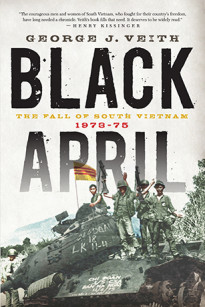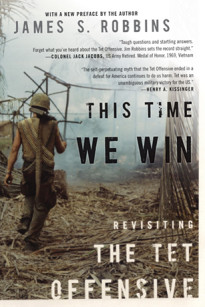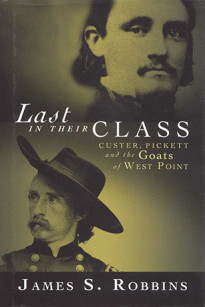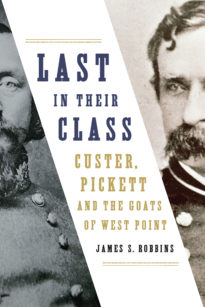Today’s Goat, the celebrated West Point cadet finishing at the bottom of his class, carries on a long and storied tradition. George Custer’s contemporaries at the Academy believed that the same spirit of adventure that led him to “blow post” at night to carouse at local taverns also motivated his dramatic cavalry attacks in the Civil War and afterwards. And the same willingness to stoically accept punishment for his hijinks at the Academy also sent George Pickett marching into the teeth of the Union guns at Gettysburg. The story James S. Robbins tells goes from the beginnings of West Point through the carnage of the Civil War to the grassy bluffs over the Little Big Horn. The Goats he profiles tell us much about the soul of the American solider, his daring, imagination and desire to prove himself against high odds.
Free shipping on all orders over $40
Last in Their Class
Custer, Pickett and the Goats of West Point
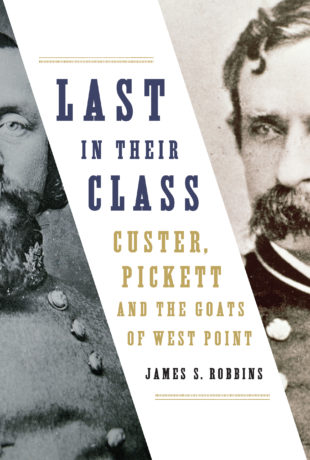
Also Purchase as e-Book
Publication Details
Paperback / 528 pages
ISBN: 9781594039232
AVAILABLE: 3/21/2017
- Media: Request a Review Copy
- Academia: Request an Exam Copy
About the Author
James S. Robbins is Deputy Editor of Rare and a member of USA Today’s board of contributors. He is the author of This Time We Win: Rethinking the Tet Offensive and Last in Their Class: Custer, Pickett and the Goats of West Point.
Excerpt
The United States Military Academy at West Point is an institution committed to excellence, which strives to equip each cadet with the knowledge and the leadership skills they will need to be Army officers and to fight and win our nation’s wars. Yet at West Point graduation ceremonies, no cadet is applauded louder than the graduate with the lowest grades, the Goat.
Graduating last at West Point is not a badge of shame but a mark of achievement. “I’d rather be last man on a first-rate team,” said one Academy graduate, “than first man on any other.” Particularly in the nineteenth century, when graduating classes were smaller and attrition rates were much higher, the Goat was seen as a survivor. No Goats stayed at the bottom of their classes for four years straight—most of those who had stood below them flunked out by graduation. As well, given the subjectivity of grading and the caprice of circumstance, being the Goat was as much a function of luck as one of ability. Coming in last in the class was thus something earned, but also fated. The same is true in war: bad breaks can disrupt the best plans, while good luck and individual effort can bring unexpected victory. Ill fortune can make a Goat, but a Goat can make himself a hero.
The Goat of the Class of 1862, Charles Nelson Warner, was simply glad to have the chance to serve. He had failed an exam in 1861 (due in part to one of George Custer’s stunts) and had been sent home to Pennsylvania. But at the onset of the Civil War, he was given a second chance. “If I conduct myself properly,” Warner wrote his sister, “I have a chance yet to outstrip those who have excelled me here. I mean to be temperate, prompt, faithful, persevering, never shirking from my duty.” After he graduated, Warner had his baptism of fire at the Battle of Antietam, and then proved his devotion to duty with a heroic stand at Chancellorsville.
Warner was the type of Goat who struggles with his studies, finds himself in over his head, but hangs on to graduate at the very bottom. Discipline and hard work are as important as intelligence at West Point, maybe more so. James E. B. Stuart, the Confederate cavalry general who graduated thirteenth in the Class of 1854, noted that success at West Point was not guaranteed by high intellect, nor denied those who were not so gifted. “For one to succeed here,” he wrote on Christmas Day of 1851, “all that is required is an ordinary mind and application; the latter is by far the most important and desirable of the two. For men of rather obtuse intellect, by indomitable perseverance, have been known to graduate with honor; while some of the greatest geniuses of the country have been found deficient, for want of application, Edgar A. Poe for instance.”
Poe could have excelled academically at West Point if he had cared to, but he was not interested in adopting the Academy’s monastic way of life and was forced to leave after half a year. James McNeill Whistler, another great American artist and a second-generation West Pointer, made it until his third year before washing out. Both were of a different type than Warner, intelligent and talented cadets to whom grades and class rank were less important than pranks, socializing and other pursuits. The 1909 Howitzer yearbook, for example, defined the Goat as “a man who would have stood first if he had boned” (i.e., studied). George C. Strong, USMA 1857, who graduated fifth in his class, said, “It is a favorite idea among many here that it requires an abler man to stand at the foot of his class throughout the course than at the head of it.” The Goat will study only enough to get by day to day, and then before exams will spend “one or two days or nights of intense application,” cramming just enough to ensure success. Strong added, “these are some of the symptoms of that epidemic which is called Genius.”

